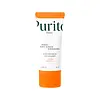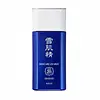What's inside
What's inside
 Key Ingredients
Key Ingredients

 Benefits
Benefits

 Concerns
Concerns

 Ingredients Side-by-side
Ingredients Side-by-side

Water
Skin ConditioningPropanediol
SolventDibutyl Adipate
EmollientDicaprylyl Carbonate
EmollientDiethylamino Hydroxybenzoyl Hexyl Benzoate
UV FilterEthylhexyl Triazone
UV AbsorberBis-Ethylhexyloxyphenol Methoxyphenyl Triazine
Skin ConditioningAmylopectin
Butylene Glycol
HumectantMethylene Bis-Benzotriazolyl Tetramethylbutylphenol
UV FilterGlycerin
HumectantBehenyl Alcohol
EmollientPoly C10-30 Alkyl Acrylate
Emulsion StabilisingPolyglyceryl-3 Methylglucose Distearate
EmulsifyingSodium Acrylates Crosspolymer-2
AbsorbentCarbomer
Emulsion StabilisingTromethamine
BufferingDecyl Glucoside
CleansingAcrylates/C10-30 Alkyl Acrylate Crosspolymer
Emulsion StabilisingBisabolol
MaskingPanthenol
Skin ConditioningCaprylhydroxamic Acid
Centella Asiatica Extract
CleansingTocopherol
AntioxidantCeramide NP
Skin ConditioningDipropylene Glycol
HumectantCholesterol
EmollientPropylene Glycol
HumectantXanthan Gum
EmulsifyingGlyceryl Stearate
EmollientCeramide As
Skin ConditioningCeramide AP
Skin ConditioningCeramide Ns
Skin ConditioningHydrogenated Lecithin
EmulsifyingCeramide EOP
Skin ConditioningWater, Propanediol, Dibutyl Adipate, Dicaprylyl Carbonate, Diethylamino Hydroxybenzoyl Hexyl Benzoate, Ethylhexyl Triazone, Bis-Ethylhexyloxyphenol Methoxyphenyl Triazine, Amylopectin, Butylene Glycol, Methylene Bis-Benzotriazolyl Tetramethylbutylphenol, Glycerin, Behenyl Alcohol, Poly C10-30 Alkyl Acrylate, Polyglyceryl-3 Methylglucose Distearate, Sodium Acrylates Crosspolymer-2, Carbomer, Tromethamine, Decyl Glucoside, Acrylates/C10-30 Alkyl Acrylate Crosspolymer, Bisabolol, Panthenol, Caprylhydroxamic Acid, Centella Asiatica Extract, Tocopherol, Ceramide NP, Dipropylene Glycol, Cholesterol, Propylene Glycol, Xanthan Gum, Glyceryl Stearate, Ceramide As, Ceramide AP, Ceramide Ns, Hydrogenated Lecithin, Ceramide EOP
Water
Skin ConditioningCyclomethicone
EmollientZinc Oxide
Cosmetic ColorantAlcohol Denat.
AntimicrobialEthylhexyl Methoxycinnamate
UV AbsorberC12-15 Alkyl Benzoate
AntimicrobialIsododecane
EmollientHdi/PPG/Polycaprolactone Crosspolymer
Tripropylene Glycol
AntioxidantDiethylamino Hydroxybenzoyl Hexyl Benzoate
UV FilterBis-Ethylhexyloxyphenol Methoxyphenyl Triazine
Skin ConditioningSaccharomyces/Lentil Seed Ferment Extract
EmollientActinidia Chinensis Fruit Extract
EmollientUlmus Davidiana Root Extract
Skin ConditioningTocopherol
AntioxidantButylene Glycol
HumectantBHT
AntioxidantIsostearic Acid
CleansingSilica
AbrasiveSqualane
EmollientZeolite
AbsorbentTalc
AbrasiveHydrogen Dimethicone
Phytosteryl Macadamiate
Skin ConditioningParfum
MaskingMica
Cosmetic ColorantWater, Cyclomethicone, Zinc Oxide, Alcohol Denat., Ethylhexyl Methoxycinnamate, C12-15 Alkyl Benzoate, Isododecane, Hdi/PPG/Polycaprolactone Crosspolymer, Tripropylene Glycol, Diethylamino Hydroxybenzoyl Hexyl Benzoate, Bis-Ethylhexyloxyphenol Methoxyphenyl Triazine, Saccharomyces/Lentil Seed Ferment Extract, Actinidia Chinensis Fruit Extract, Ulmus Davidiana Root Extract, Tocopherol, Butylene Glycol, BHT, Isostearic Acid, Silica, Squalane, Zeolite, Talc, Hydrogen Dimethicone, Phytosteryl Macadamiate, Parfum, Mica
 Reviews
Reviews

Ingredients Explained
These ingredients are found in both products.
Ingredients higher up in an ingredient list are typically present in a larger amount.
You might know this ingredient as Tinosorb S or Bemotrizinol. It is a UV filter that covers both UVA and UVB rays.
This ingredient has two peak UV absorption peaks ( 310 and 340 nm) and is able to absorb both UV-A and UV-B rays. This ingredient works by preventing UV rays from reaching and damaging your skin.
On top of that - it is highly photostable and helps prevent the photodegration of other sunscreen ingredients such as avobenzone.
Tinosorb S is allowed in the EU, Australia, and Asia. It is close to being approved by the FDA and we'll hopefully get this ingredient in the U.S. by late 2025.
Fun fact: Tinosorb S is the most effective UV absorber at maximum concentration (measured by SPF) permitted in the EU.
This ingredient is oil-soluble, so your oil-cleansers will take this right off at night.
Learn more about Bis-Ethylhexyloxyphenol Methoxyphenyl TriazineButylene Glycol (or BG) is used within cosmetic products for a few different reasons:
Overall, Butylene Glycol is a safe and well-rounded ingredient that works well with other ingredients.
Though this ingredient works well with most skin types, some people with sensitive skin may experience a reaction such as allergic rashes, closed comedones, or itchiness.
Learn more about Butylene GlycolDiethylamino Hydroxybenzoyl Hexyl Benzoate (DHHB) is a chemical UV-A absorber. It is formulated for high UVA protection (320-400 nm).
DHHB is well-liked for:
DHHB has been approved by the EU, Japan, Taiwan, and South America for use up to 10%. Unfortunately, it has not been approved for use in the US or Canada due to slow regulatory processes.
This ingredient is soluble in oils, fats, and lipids.
Learn more about Diethylamino Hydroxybenzoyl Hexyl BenzoateTocopherol (also known as Vitamin E) is a common antioxidant used to help protect the skin from free-radicals and strengthen the skin barrier. It's also fat soluble - this means our skin is great at absorbing it.
Vitamin E also helps keep your natural skin lipids healthy. Your lipid skin barrier naturally consists of lipids, ceramides, and fatty acids. Vitamin E offers extra protection for your skin’s lipid barrier, keeping your skin healthy and nourished.
Another benefit is a bit of UV protection. Vitamin E helps reduce the damage caused by UVB rays. (It should not replace your sunscreen). Combining it with Vitamin C can decrease sunburned cells and hyperpigmentation after UV exposure.
You might have noticed Vitamin E + C often paired together. This is because it is great at stabilizing Vitamin C. Using the two together helps increase the effectiveness of both ingredients.
There are often claims that Vitamin E can reduce/prevent scarring, but these claims haven't been confirmed by scientific research.
Learn more about TocopherolWater. It's the most common cosmetic ingredient of all. You'll usually see it at the top of ingredient lists, meaning that it makes up the largest part of the product.
So why is it so popular? Water most often acts as a solvent - this means that it helps dissolve other ingredients into the formulation.
You'll also recognize water as that liquid we all need to stay alive. If you see this, drink a glass of water. Stay hydrated!
Learn more about Water